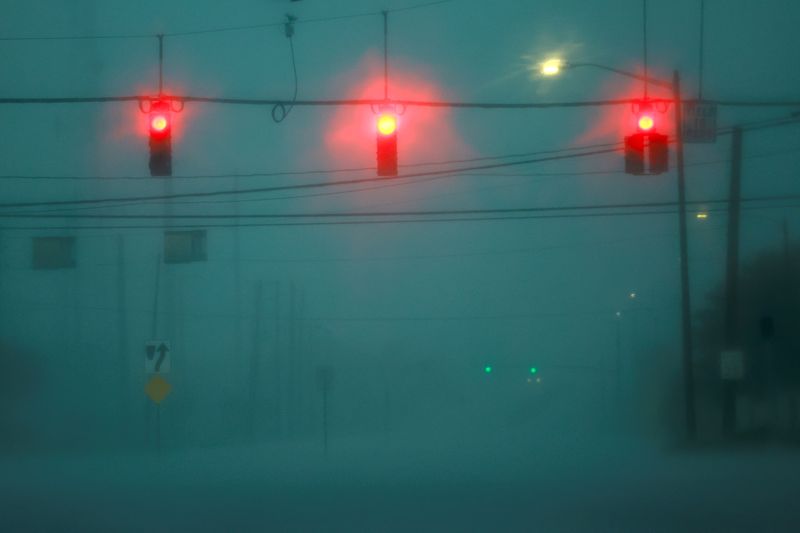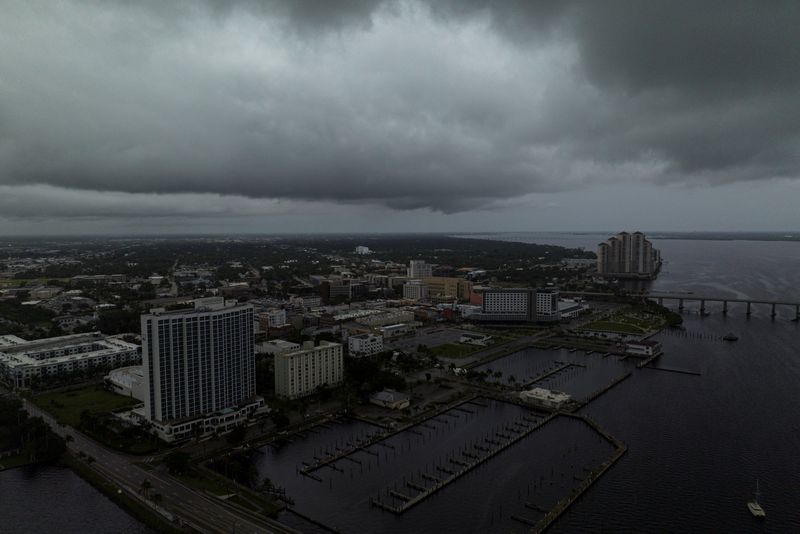By Brad Brooks and Leonara LaPeter Anton
ST. PETERSBURG, Florida (Reuters) -Hurricane Milton marched across central Florida on Thursday after making landfall on the state's west coast hours earlier, whipping up deadly tornadoes, destroying homes and knocking out power to nearly 2 million customers.
The storm made landfall around 8:30 p.m. EDT (0030 GMT) on Wednesday as a Category 3 hurricane with maximum sustained winds of 120 miles per hour (195 kph) near Siesta Key, the U.S. National Hurricane Center said.
By 11 p.m. EDT (0300 GMT), wind speeds had reduced to 105 mph (165 kph), dropping Milton to a Category 2 hurricane, nonetheless still considered extremely dangerous. The eye of the storm was 75 miles (120 km) southwest of Orlando in the center of the state.
A flash flood emergency was in effect for the Tampa Bay area including the cities of Tampa, St. Petersburg and Clearwater, the hurricane center said, with St. Petersburg already receiving 16.6 inches (422 mm) of rain on Wednesday.
The eye of the storm landed in Siesta Key, a barrier island town of some 5,400 off Sarasota about 60 miles (100 km) south of the Tampa Bay metropolitan area, which is home to more than 3 million people.
Governor Ron DeSantis said he hoped Tampa Bay, once seen as the potential bull's eye, could dodge major damage and that the worst of the predicted storm surge could be avoided thanks to the landfall coming before the high tide. Forecasters said seawater could still rise as high as 13 feet (4 meters).
DeSantis reported Milton had also spawned at least 19 tornadoes caused damage in numerous counties, destroying around 125 homes, most of them mobile homes.
"At this point, it's too dangerous to evacuate safely, so you have to shelter in place and just hunker down," DeSantis said upon announcing the landfall.
At least two deaths were reported at a retirement community following a suspected tornado in Fort Pierce on the eastern coast of Florida, NBC News reported, citing St. Lucie County Sheriff Keith Pearson. His department did not immediately respond to a request for details.
Pearson estimated 100 homes were destroyed in the county where some 17 tornadoes touched down, NBC said.
More than 1.8 million homes and businesses in Florida were without power, according to PowerOutage.us.
The storm was expected to cross the Florida peninsula overnight and emerge into the Atlantic, still with hurricane force, on Thursday.
Once past Florida, it should weaken over the western Atlantic, possibly dropping below hurricane strength but still posing a storm-surge danger on the state's Atlantic Coast.
In a state already battered by Hurricane Helene two weeks ago, as many as two million people were ordered to evacuate, and millions more live in the projected path of the storm.
Much of the southern U.S. experienced the deadly force of Hurricane Helene as it cut a swath of devastation through Florida and several other states. Both storms are expected to cause billions of dollars in damage.
ZOO ANIMALS PROTECTED
While human evacuees jammed the highways and created gasoline shortages, animals including African elephants, Caribbean flamingos and pygmy hippos were riding out the storm at Tampa's zoo.
Nearly a quarter of Florida's gasoline stations were out of fuel on Wednesday afternoon.
The Federal Emergency Management Agency had moved millions of liters (gallons) of water, millions of meals and other supplies and personnel into the area. None of the additional aid will detract from recovery efforts for Hurricane Helene, the agency's administrator, Deanne Criswell, said earlier on Wednesday.
Trucks have been running 24 hours a day to clear mounds of debris left behind by Helene before Milton potentially turned them into dangerous projectiles, DeSantis said.
About 9,000 National Guard personnel were deployed in Florida, ready to assist recovery efforts, as were 50,000 electricity grid workers in anticipating of widespread power outages, DeSantis said.

Search-and-rescue teams were prepared to head out as soon as the storm passes, working through the night if needed, DeSantis said.
"It's going to mean pretty much all the rescues are going to be done in the dark, in the middle of the night, but that's fine. They're going to do that," DeSantis said.
